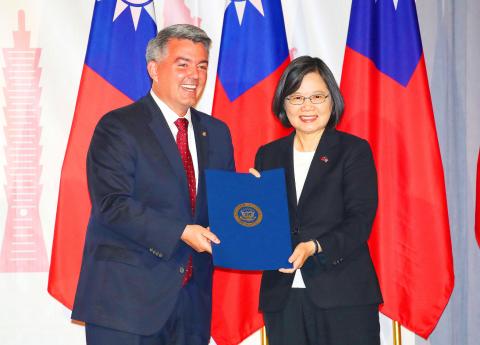US Senator Cory Gardner on Friday urged the US to stand with Taiwan as it faces growing threats, and said that ties between the two democracies are stronger than ever.
Gardner, who represents Colorado, made the remarks before joining Colorado Governor Jared Polis and about 700 Taiwanese expats at a banquet for President Tsai Ing-wen (蔡英文).
“We can look no further than Hong Kong to see the threats that Taiwan faces and the challenges that Taiwan faces. That is why it is more important than ever that we stand with Taiwan,” said Gardner, who chairs the US Senate Foreign Relations Subcommittee on East Asia, the Pacific and International Cybersecurity Policy.

Photo: CNA
He was referring to the Hong Kong protests that have erupted in response to a proposed extradition bill that would allow authorities there to extradite criminal suspects to mainland China to face trial.
Although the Hong Kong government has “indefinitely suspended” the bill, fears persist among Hong Kongers that they could lose their freedoms and rights under China’s “one country, two systems” framework.
Tsai arrived in Denver, Colorado, earlier in the day on the last stop of a 12-day trip that included a stopover in New York City en route to Taiwan’s four diplomatic allies in the Caribbean.
Shortly after Tsai’s arrival in Denver, she had a closed-door meeting with Gardner to discuss security matters, economic opportunities, the Taiwan-US relationship, a possible bilateral free-trade agreement and several other issues, Gardner told reporters.
The US government’s announcement earlier this month of a US$2.22 billion arms package to Taiwan highlighted Washington’s fulfillment of its obligations to Taipei under the US’ Taiwan Relations Act, he said.
“It is also something that we acknowledged in the Asia Reassurance Initiative Act signed into law by the [US] president on Dec. 31, where we will continue making arms sales to Taiwan, that we will regularize and routinize these kinds of sales as we continue to do more,” Gardner said.
He would continue to work with US President Donald Trump’s administration to launch discussions with Taiwan about a potential free-trade agreement, he added.
Tsai’s “historic visit” to Colorado came at a time when “the US-Taiwan relationship is at the strongest point they have ever been,” Gardner said, adding that it was the first time a sitting Taiwanese president had visited the state.
“If you look at the relationship and the support the people of the US have for Taiwan, it has never been greater,” he said.
Yesterday, he and Tsai were to discuss opportunities for cooperation in the energy industry, Gardner said.
“I think this will be a great chance for us to further show what two great democratic voices, the US and Taiwan, can do together,” he said.
Tsai on Friday also held a closed-door meeting with Polis, where they talked about Colorado’s promotion of renewable energy, and cultural and educational exchanges, National Security Council Deputy Secretary-General Tsai Ming-yen (蔡明彥) said.
Polis expressed the hope of seeing more cooperation between the two sides on higher education, given that there are about 200 Taiwanese students in Denver, he said, adding that Polis also pledged to visit Taiwan when he visits Asia next year or in 2021.

Conflict with Taiwan could leave China with “massive economic disruption, catastrophic military losses, significant social unrest, and devastating sanctions,” a US think tank said in a report released on Monday. The German Marshall Fund released a report titled If China Attacks Taiwan: The Consequences for China of “Minor Conflict” and “Major War” Scenarios. The report details the “massive” economic, military, social and international costs to China in the event of a minor conflict or major war with Taiwan, estimating that the Chinese People’s Liberation Army (PLA) could sustain losses of more than half of its active-duty ground forces, including 100,000 troops. Understanding Chinese

The Ministry of Foreign Affairs (MOFA) yesterday said it is closely monitoring developments in Venezuela, and would continue to cooperate with democratic allies and work together for regional and global security, stability, and prosperity. The remarks came after the US on Saturday launched a series of airstrikes in Venezuela and kidnapped Venezuelan President Nicolas Maduro, who was later flown to New York along with his wife. The pair face US charges related to drug trafficking and alleged cooperation with gangs designated as terrorist organizations. Maduro has denied the allegations. The ministry said that it is closely monitoring the political and economic situation

UNRELENTING: China attempted cyberattacks on Taiwan’s critical infrastructure 2.63 million times per day last year, up from 1.23 million in 2023, the NSB said China’s cyberarmy has long engaged in cyberattacks against Taiwan’s critical infrastructure, employing diverse and evolving tactics, the National Security Bureau (NSB) said yesterday, adding that cyberattacks on critical energy infrastructure last year increased 10-fold compared with the previous year. The NSB yesterday released a report titled Analysis on China’s Cyber Threats to Taiwan’s Critical Infrastructure in 2025, outlining the number of cyberattacks, major tactics and hacker groups. Taiwan’s national intelligence community identified a large number of cybersecurity incidents last year, the bureau said in a statement. China’s cyberarmy last year launched an average of 2.63 million intrusion attempts per day targeting Taiwan’s critical

AGING: As of last month, people aged 65 or older accounted for 20.06 percent of the total population and the number of couples who got married fell by 18,685 from 2024 Taiwan has surpassed South Korea as the country least willing to have children, with an annual crude birthrate of 4.62 per 1,000 people, Ministry of the Interior data showed yesterday. The nation was previously ranked the second-lowest country in terms of total fertility rate, or the average number of children a woman has in her lifetime. However, South Korea’s fertility rate began to recover from 2023, with total fertility rate rising from 0.72 and estimated to reach 0.82 to 0.85 by last year, and the crude birthrate projected at 6.7 per 1,000 people. Japan’s crude birthrate was projected to fall below six,